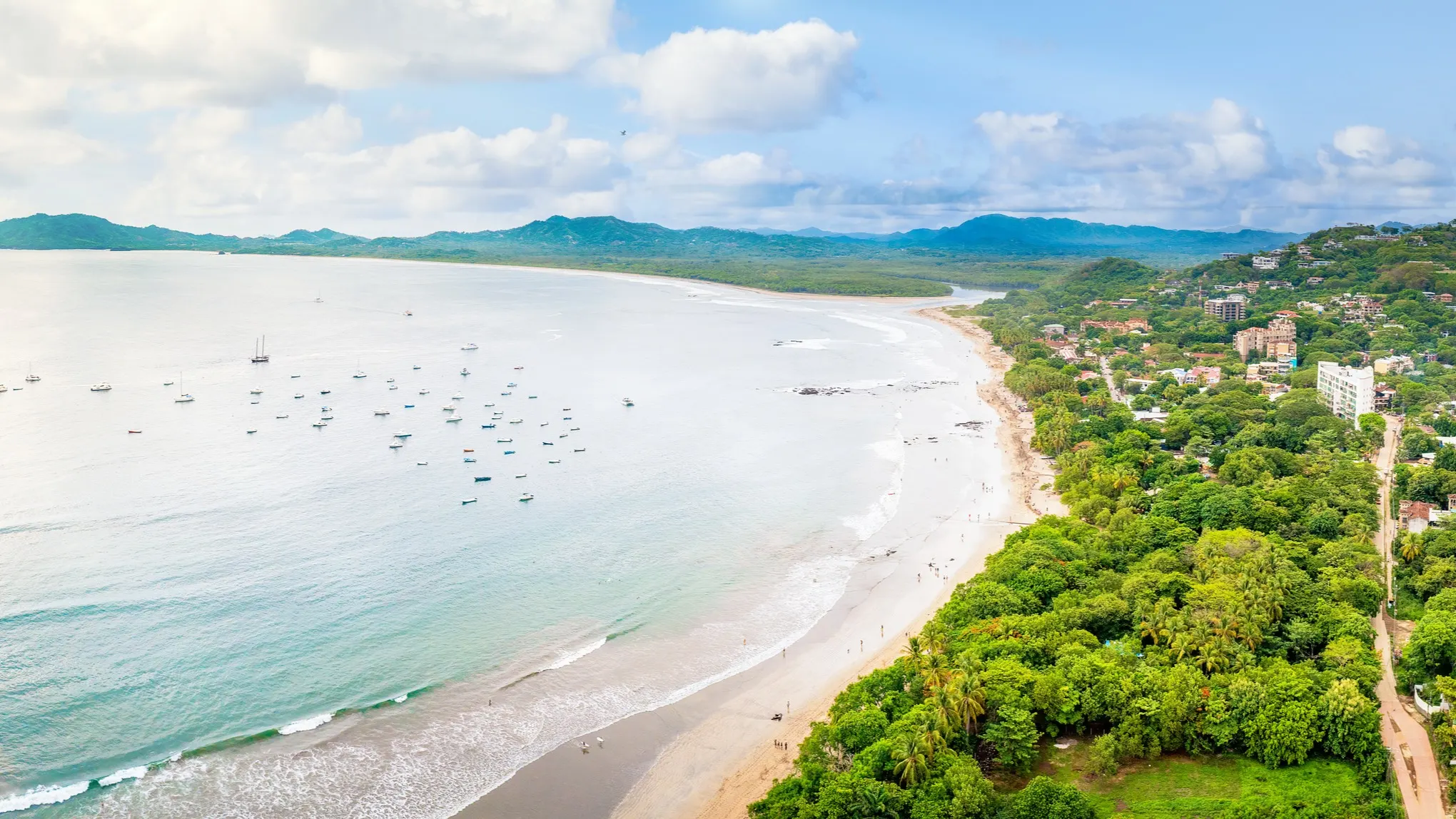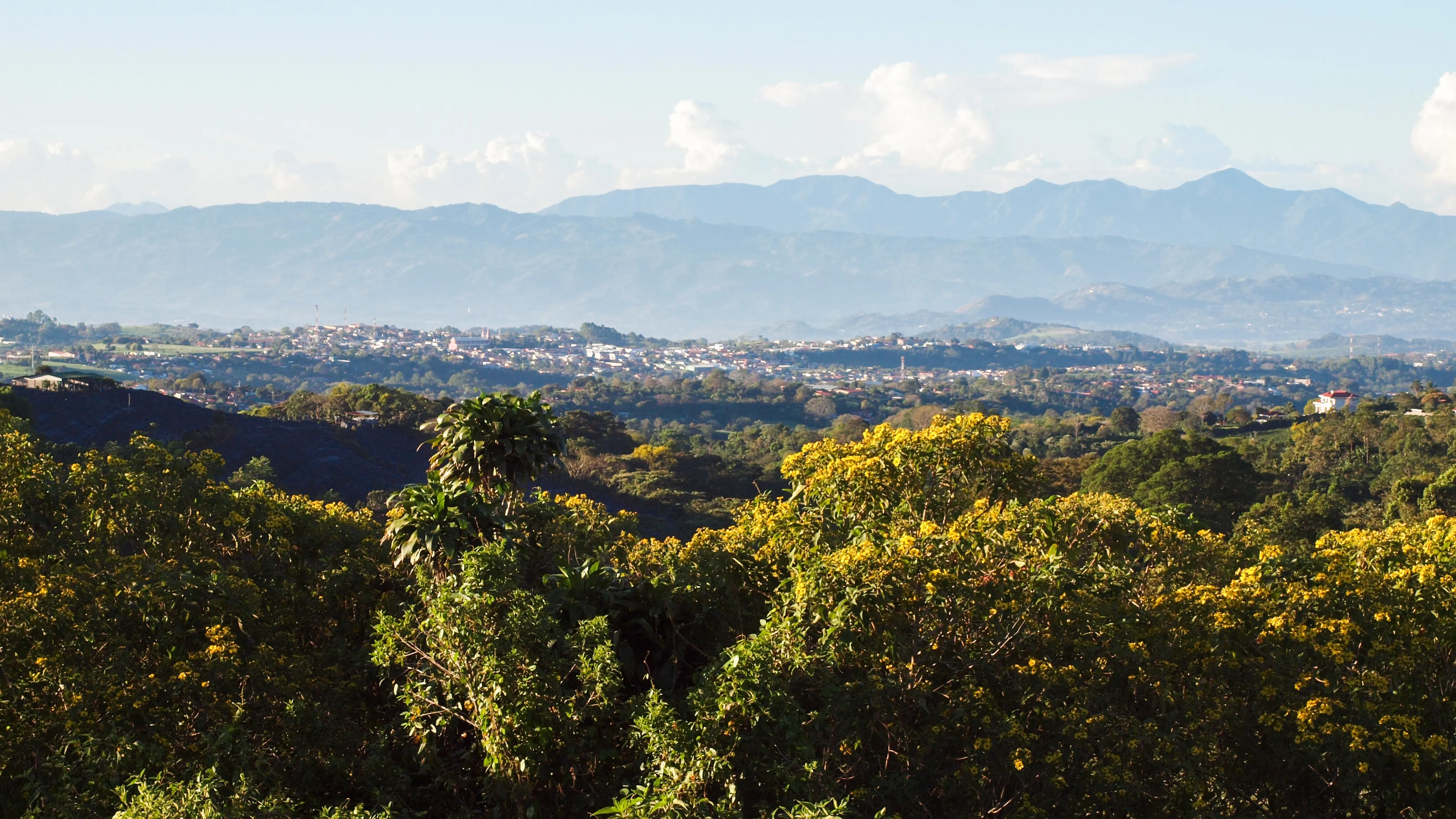Long Term Travel With Kids: Moving Abroad With Your Kids – IL
11 min readCosta Rica consistently ranks in the top five countries in the International Living Retirement Index, and it’s no surprise why. The country’s allure entices many people because of its long-established democracy, stable political scene, pristine natural environment, friendly Ticos, and easy access to US airports. The country’s English translation, Rich Coast, speaks to its name.
The easygoing Pura Vida vibe offers the opportunity to slow down and enjoy the good life, which for many here includes spending time outdoors, relishing the beauty of nature, and sharing in community with locals and other expats.
Costa Rica‘s biodiversity is unmatched; its compact size (about the same as West Virginia) packs a punch since it contains around 6% of the world’s biodiversity. Clean and safe drinking water, reliable internet service, great surfing and deep-sea fishing, lively beach towns, and lush cloud forests make many people flock to this Central American gem.
Learn more about Costa Rica and other countries in our daily postcard e-letter. Simply enter your email address below and we’ll send you a FREE REPORT – Explore the Old World in Laidback Costa Rica.
By submitting your email address, you will receive a free subscription to IL Postcards and special offers from International Living and our affiliates. You can unsubscribe at any time, and we encourage you to read more about our Privacy Policy.

©iStock/Caroline Brundle Bugge
Costa Rica’s climate, amiable culture, and affordable cost of living offer a high quality of life that attracts many people from around the world.
You find a variety of climates here, so decide what you are comfortable living in. You may be a tropical beach person who loves the heat and humidity. Yet, for some, this climate can be too much. Therefore, the Central Valley and Lake Arenal areas offer milder temperatures. Living at higher elevations means cooler temperatures; there are many places in the mountains to check out.
Ticos (people from Costa Rica) are known for their friendly, inviting, and welcoming hospitality. They are always ready to help and value togetherness; spending time with family and community is integral to their culture. Although it is a predominantly Catholic country, it’s open and accepting of the LGBTQ community. You can find the pride flag waving in the breeze next to the Costa Rican flag while walking around San Jose, the country’s capital.
The cost of living is a broad topic and depends on a person’s lifestyle and everyday choices. Discover the place that best fits your needs by researching and spending time in different areas to get a feel for the country. A retiree may pay $1,400 monthly for expenses in the Central Valley, while a family may live on a monthly budget of $4,000 (or even thousands more) on the beach.
Learn more about Costa Rica and other countries in our daily postcard e-letter. Simply enter your email address below and we’ll send you a FREE REPORT – Explore the Old World in Laidback Costa Rica.
By submitting your email address, you will receive a free subscription to IL Postcards and special offers from International Living and our affiliates. You can unsubscribe at any time, and we encourage you to read more about our Privacy Policy.

Hills of Grecia, Central Valley, Costa Rica|Jason Holland
When moving to another country, you can never do too much research! Costa Rica’s varied regions and cities offer a variety of experiences.
Going on vacation and residing in a country are two different things. The following list includes topics to research before the move:
Internet service
Banks
Finding a good lawyer and accountant
Buying a car
Mail options
Cell phone and international calling options
Food options
Clothing and household options
Community events
Education options
Medical, dental, and pet care
Extracurricular activities
The weather throughout the year
High and low season months depending on location
Depending on your destination, choose from two international airports, one in Liberia and one in San Jose, which provide convenient daily flights from North America and Europe. You can legally stay in the country for 180 days as a tourist, and some people start their move using this option. Once your time is up, you can take a day trip to neighboring Nicaragua or Panama for another 180-day stay.
Costa Rica is a popular destination for retirees. However, times are changing, and people don’t always wait until retirement to make the big move. No matter your situation, after having temporary residency for three years, you can apply for permanent residency.
A permanent resident can work legally in Costa Rica, while a temporary resident can own or run a business; however, they must employ locals for labor. Both options pay into the CAJA, Costa Rica’s health care system.
Here are the options and requirements for applying for temporary residency in Costa Rica.
To apply for the pensionado residency for retirees, provide proof of a minimum monthly income of $1,000 from a retirement fund or permanent pension source.
The rentista category includes depositing $60,000 in a local or foreign bank and setting up a monthly transfer of $2,500 into a Costa Rican account for expenses over two years. Then, after 24 months, you must deposit another $60,000 to restart the process.
An inversionista residency requires a one-time investment of $150,000 in real estate, stocks, and bonds or another opportunity.
If married to a Costa Rican, you can apply for temporary residency as a spouse.
If your child is born in Costa Rica, they are a citizen. Therefore, you can apply for permanent residency as a parent. This is referred to as residencia permanente por vinculo.
Costa Rica has a digital nomad visa for working remotely. For this visa, you must prove you had at least $3,000 of deposits per month ($4,000 for a couple or family) during the last year. With this visa, you don’t have to leave the country every 180 days. You can renew it for a second year as long as the holder spends at least 180 days in Costa Rica during the first year. This visa is exempt from paying taxes and the Caja healthcare system.
Many expats living in Costa Rica don’t speak Spanish and get by just fine, especially those in tourist areas. For example, living on the beaches of Guanacaste, one finds themselves in an ‘English bubble’ due to the high number of tourists and English-speaking expats in the area. The amount of Spanish you hear depends on where you live in Costa Rica. Living in the Central Valley means more opportunities to immerse yourself in Spanish.
There are many resources for learning Spanish, especially with the convenience of online classes. You may practice with Warren Hardy’s online course or check out We Speak Spanish, which offers online and face-to-face classes around Costa Rica (in Santa Ana, Atenas, Sabana, Ciudad Colon, and San Ramon). These locations are also a good indicator of popular expat areas in the country to visit.
Living costs depend on your lifestyle. Costa Rica has something for everyone. Different regions are more expensive than others. For example, living on popular tourist beaches generally means higher prices.
Imported goods, such as cars, can be expensive here in Costa Rica, as the import tax is high. However, Law 9996 was created to attract investors, rentiers, and pensioners to Costa Rica and is planned to be available until 2030. This law applies to anyone with a migratory status through the current minimum investment of $150,000 to apply for these benefits. These incentivesprovide a way to ship home furnishings and import two vehicles free of import tax, tariffs, and VAT.
Private schools, depending on the school and its location, charge between $200 and $1,000 a month for those with children. Those looking to retire in Costa Rica often decide to move because their Social Security payment stretches further in paradise.
In Atenas, Karen’s monthly expenses are about $2,000. These include a three-bedroom/one-bath rental, the Caja (socialized healthcare payment) payment, utilities, food, gas, car maintenance, travel within the country, and entertainment.
While in Grecia, Lynda lives well on a monthly budget of just $1,600. Her budget includes a two-bedroom, two-bath rental, all food, including meals out and entertainment, taxis, public transportation when she isn’t walking, her Medicare payment in the US, and insurance for her truck in the US.
Facebook groups are an excellent resource for looking for places to live. Join various groups, especially those focusing on your favorite parts of the country. Ask questions and get to know people so you have some contacts during your scouting trip. Talking with people about their experiences is always a good idea.
Many expats rent an Airbnb in areas they are interested in to get real-life experience. Then, they are on the ground to find more permanent rental opportunities.
Here are some other resources to check out for rentals:
Costa Rica is known for its high level of healthcare. There are two systems available for expats: the government-run universal healthcare system, Caja Costarricense de Seguro Social, known as Caja, and the private system. Both health systems are constantly being upgraded—new hospitals, new equipment, and improvements in staff training. Once a resident, you must pay monthly into the socialized system.
The best facilities and specialists are found in the Central Valley. Overall, expats in Costa Rica pay a fraction of what they did back home for healthcare. Out-of-pocket costs for treatments in Costa Rica can be 40 to 70% less than in the US. For example, a doctor’s visit typically costs around $50, and a specialist’s visit between $80 – $100. Medismart is a popular service that offers discounted medical prices in the country.
Creating a medical plan in case of an emergency when abroad is a good idea. Leave a detailed document in a safe space with your medical history, including medications, allergies, and insurance details, so if you become unresponsive or unable to speak for yourself, a trusted person with a key could help. Also, you should share payment details with a friend, as this is often required before any emergency procedures occur when you are not part of the Caja system at a public facility.
Learn more about Costa Rica and other countries in our daily postcard e-letter. Simply enter your email address below and we’ll send you a FREE REPORT – Explore the Old World in Laidback Costa Rica.
By submitting your email address, you will receive a free subscription to IL Postcards and special offers from International Living and our affiliates. You can unsubscribe at any time, and we encourage you to read more about our Privacy Policy.
To legally work at a job in Costa Rica, you must either be a citizen of the country or have legal permanent residence. Generally, to obtain permanent residence, you must have temporary residence for at least three years before applying.
As stated before, digital nomad visas are an option. Additionally, many people tend to travel and stay in a country for 3 to 6 months at a time and then head somewhere new. Costa Rica offers so much nature and beauty that many people want to experience this world for themselves.
Not all airlines allow dogs, and they aren’t allowed to travel all year long. Currently, Alaska Airlines, American Airlines, and Lufthansa fly pets as luggage or in-cabin directly to Costa Rica. It is best to call the airline and confirm their procedures.
The current requirements are as follows:
Internal and external deworming within 15 days before the flight
Multiple vaccine (Distemper/Parvovirus/Leptospira/Hepatitis)
Rabies vaccine (must be at least three months old). Most airlines require that the rabies vaccine be given at least 30 days before the flight.
A completed physical exam with no infectious disease is needed to complete the exportation certificate.

There are many expat havens in Costa Rica. Beach areas include Guanacaste, Punteranous, and Limón. Punteranous is extensive and is located south of Guanacaste on the peninsula, as are the Central and South Pacific beaches. Many expats live in Tamarindo, Brasilito, Flamenco, Playas de Coco, and Avellanas. Further south, the sleepier beach towns of Nosara and Samara are gaining popularity. And you might even want to check out the southern part of the peninsula to see Santa Teresa and Mal Pais.
The inland provinces include Alajuela, Heredia, San Jose, and Cartago. In the Central Valley, you may want to research life in Grecia, Atenas, Escazu, Alajuela, Santa Ana, Pavas, Tres Rios, and Cartago.
Lake Arenal is also a popular area. Choose from Tronadora, Nuevo Arenal, or the La Fortuna area. The climate around Lake Arenal varies. For example, further west, Nuevo Arenal gets about 50% more rain than Tronadora, located just across the lake. And Tronadora is much windier. La Fortuna and the surrounding towns like Chachagua are drier and warmer.
Learn to use the different seasons to your advantage. If the rain is too heavy in Guanacaste in September and October (the peak of the green season), travel to the Arenal and Caribbean areas since that is their dry season.
There’s nothing as valuable as getting insider tips from expats who have already taken the leap and are living their best lives in Costa Rica.
Use a credit card with no foreign transaction fees. Look into Charles Schwab or Capital One. Additionally, research credit cards for cash back, miles, and points so you can benefit from free flights in the future.
Nowadays, fluffy towels are available at PriceSmart; however, fewer sizes and colors are available. I still tend to bring soft, fluffy towels back in my suitcases. Many of the towels in other stores simply don’t wick away the water from your skin.
Be sure to understand how climate changes throughout the year in the area where you desire to live. Due to the many microclimates in Costa Rica, there are drastic changes in terrain and weather within short distances. From the Gold Coast at sea level, a three-hour trip gets you to 1,300 meters (about 4265.09 ft) elevation in Monteverde and a cooler climate. On the other hand, the Caribbean Coast is flatter and more humid.
Banking in Costa Rica is often a practice of patience. Depositing money into your account could take an hour or two. These long waits help you appreciate those rare days when you get in and out quickly. I always bring my computer so I can get things done while waiting. At some banks, non-residents can open a bank account with a passport, an up-to-date visa, and a reference letter from someone who banks there and knows you in some commercial capacity, such as your landlord. Each bank has its requirements, so find out what you need according to the bank you choose. Some non-residents can only open an account if they have a corporation.
Costa Rica is full of tropical fruits and vegetables. Connect with locals or take cooking classes to learn how to use these ingredients, and shop at ferias to support local producers, who usually have lower prices. Have you ever had jugo de cas or momón chinos?
Do what makes you happy. Costa Rica makes many people happy! Are you searching for a more relaxed lifestyle, warm weather, an affordable cost of living, and a high level of health care? Costa Rica may be the perfect place to call home, too.
Do your research and take advantage of all the resources IL offers. We have people living in different countries so that you can get the up-to-date information you desire. Members, ask all of your pressing questions in our community.
By Kathleen Evans
Learn more about Costa Rica and other countries in our daily postcard e-letter. Simply enter your email address below and we’ll send you a FREE REPORT – Explore the Old World in Laidback Costa Rica.
By submitting your email address, you will receive a free subscription to IL Postcards and special offers from International Living and our affiliates. You can unsubscribe at any time, and we encourage you to read more about our Privacy Policy.
Discover more from Slow Travel News
Subscribe to get the latest posts sent to your email.



